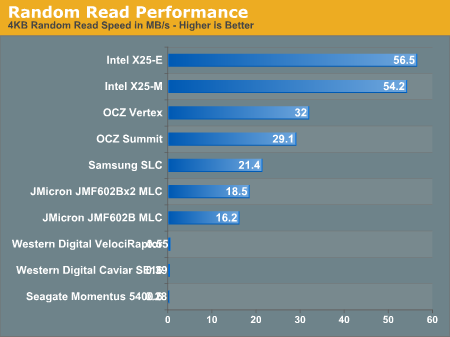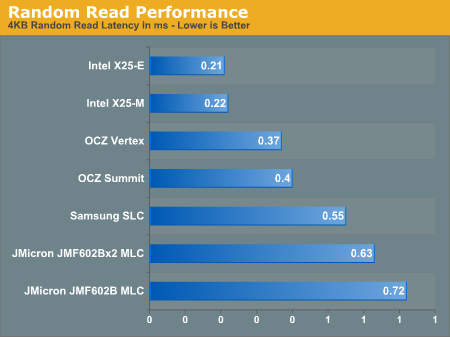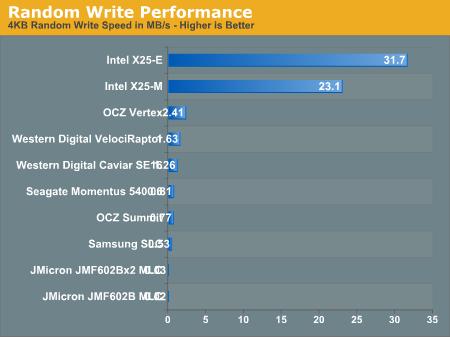The SSD Anthology: Understanding SSDs and New Drives from OCZ
by Anand Lal Shimpi on March 18, 2009 12:00 AM EST- Posted in
- Storage
Random Read/Write Performance
Arguably much more important to any PC user than sequential read/write performance is random access performance. It's not often that you're writing large files sequentially to your disk, but you do encounter tons of small file reads/writes as you use your PC.
To measure random read/write performance I created an iometer script that peppered the drive with random requests, with an IO queue depth of 3 (to add some multitasking spice to the test). The write test was performed over an 8GB range on the drive, while the read test was performed across the whole drive. I ran the test for 3 minutes.

The three hard drives all posted scores below 1MB/s and thus aren't visible on our graph above. This is where SSDs shine and no hard drive, regardless of how many you RAID together, can come close.
The two Intel drives top the charts and maintain a huge lead. The OCZ Vertex actually beats out the more expensive (and unreleased) Summit drive with a respectable 32MB/s transfer rate here. Note that the Vertex is also faster than last year's Samsung SLC drive that everyone was selling for $1000. Even the JMicron drives do just fine here.
If we look at latency instead of transfer rate it helps put things in perspective:

Read latencies for hard drives have always been measured in several ms, but every single SSD here manages to complete random reads in less than 1ms under load.
Random write speed is where we can thin the SSD flock:

Only the Intel drives and to an extent, the OCZ Vertex, post numbers visible on this scale. Let's go to a table to see everything in greater detail:
| 4KB Random Write Speed | |
| Intel X25-E | 31.7 MB/s |
| Intel X25-M | 23.1 MB/s |
| JMicron JMF602B MLC | 0.02 MB/s |
| JMicron JMF602Bx2 MLC | 0.03 MB/s |
| OCZ Summit | 0.77 MB/s |
| OCZ Vertex | 2.41 MB/s |
| Samsung SLC | 0.53 MB/s |
| Seagate Momentus 5400.6 | 0.81 MB/s |
| Western Digital Caviar SE16 | 1.26 MB/s |
| Western Digital VelociRaptor | 1.63 MB/s |
Every single drive other than the Intel X25-E, X25-M and OCZ's Vertex is slower than the 2.5" Seagate Momentus 5400.6 hard drive in this test. The Vertex, thanks to OCZ's tweaks, is now 48% faster than the VelociRaptor.
The Intel drives are of course architected for the type of performance needed on a desktop/notebook and thus they deliver very high random write performance.
Random write performance is merely one corner of the performance world. A drive needs good sequential read, sequential write, random read and random write performance. The fatal mistake is that most vendors ignore random write performance and simply try to post the best sequential read/write speeds; doing so simply produces a drive that's undesirable.
While the Vertex is slower than Intel's X25-M, it's also about half the price per GB. And note that the Vertex is still 48% faster than the VelociRaptor here, and multiple times faster in the other tests.










250 Comments
View All Comments
Jamor - Wednesday, March 18, 2009 - link
The best tech article I've ever read, and I've read a few.haze4peace - Wednesday, March 18, 2009 - link
Wow, excellent article and so much useful information in an easy to understand way. I have just recently been paying attention to SSDs and thanks to this article I am armed with the information to make the correct choice for my needs. Thanks AnandTech, its the deep and honest articles like these that keep me coming back for more.Alseki - Wednesday, March 18, 2009 - link
I just registered then simply to say, great article. Really informative and enjoyable to read.alexsch8 - Wednesday, March 18, 2009 - link
Anand,Thank you for this article, very informative.
Looking at the example you are giving with your self-manufactured SSD drive: If I save the DOC I use up a page. Based on what you are saying, if I make a change to that DOC, it would then be saved in the next page instead of overwriting the existing page? If that is true, then the File Allocation system (FAT or MFT) itself would contribute quite a bit to the 'filling up of pages' phenomena. Could you elaborate if the proposed file system for SSD addresses this?
Ytterbium - Wednesday, March 18, 2009 - link
Fantastic article, shame that the vendors blacklisted you for telling the truth and OCZ rock for working so hard to address issues.I'll be ordering my Intel SSD soon, I'll defintly consider the Summit when it comes out for my encoding rig as there sequental writes matter to me.
mindless1 - Wednesday, March 18, 2009 - link
Great even, but I've have to disagree with the significance of the passage that suggested the Indilinx controller makes data loss as bad on those SSD as on a conventional hard drive.The primary cause of data loss is mechanical or component failure, not power loss. If we want to consider power loss, it's not just the drive which is prone to lose data, the entire system memory suffers far more data loss than that.
Further, a sufficiently sized supercapacitor should keep the drive operating for a period of time beyond when the rest of the system would be operational, it could be sufficient for the controller to finish writing to flash all received data (or just use an UPS, that's what they're for?).
Second, I can't believe that OCZ only tests designs with HDTach and Atto, I think it more likely they knew of the problem but didn't expect anyone to find it so quickly, and felt the higher sequential speeds made it more marketable. This makes me feel that manufacturers, then online sellers should differentiate their drives with a standardized random read/write score.
What would be really nice is if the Indilinx based SSDs had an application available, similar to a HDD acoustic management bit changing app, that lets the owner set their own preference for IO versus sequential read performance.
gomakeit - Wednesday, March 18, 2009 - link
This is by far the BEST article on SSD I've ever read! Great job anand and yes I read every single word of it!MagicPants - Wednesday, March 18, 2009 - link
Don't they ever try using their own devices? One second of latency should slap any user in the face. It should be very easy for a manufacturer to build a system with their new technology put it in front of people and see what happens, but apparently they're not doing this.They wait for reviewers to do the work for them and then get upset when they find a problem.
What the manufacturers should be taking away from this article is:
1) Try your competitor's products
2) Try your own products
3) Try them in real life as opposed to synthetic tests
4) Compare everything you've tried and market the performance that matters
7Enigma - Thursday, March 19, 2009 - link
But that would make sense....and we know marketing rarely does.paulinus - Wednesday, March 18, 2009 - link
That art is great. Finally someone done ssd test's right, and said loud what we, customers, can get for that hefty pricetags.I've supposed that only choices are intel and new ocz's. Now I know, and big kudos for that.
Just need a bit more $$ for x25-m, it'll be ideal for heavy workstation use, and biggest vertex'll replace wd black in my aging 6910p :)